动词不规则变化形容词副词
(完整版)形容词变副词的变化规则

形容词变副词:形容词+ly 构成副词的规则:情况一般情况少数以元音字母+e 结尾大部分+e 结尾的词直接辅音字母+y 结尾le结尾ll结尾ic 结尾的词(public-publicly 例外)不规则变化: 构成加-ly去e加-ly加-ly将y 改为i再加-ly去e 加-y只加-y加-ally例词与练习例:quick-quickly练:brave-例:true-truly练:due-例:nice-nicely练:wise-例:easy-easily练:happy-例:simple-simply练:possible-例:full-fully练:dull-例:basic-basically练:scientific-care-wide-heavy-comfortable-automatic-1.本身既是形容词也是副词,无需改变:fast----fast,early----early,high----high,hard----hard,late----late,far----far wide----wide,alone----alone2. 虽然以ly 结尾,但却是形容词,不能直接用来修饰动词:friendly,lively,lovely,lonely,likely,motherly,manly等。
3. 有些形容词本身即为副词,同时也有加-ly 的副词形式。
但加不加ly 意思不一样,使用时需注意,如:late(形容词,晚的)---late(副词,晚地),lately(最近)high(形容词,高的)--high(副词,高地),highly(副词,高度地,恨非常)。
必须牢记的英语十类词性分类及用法

词类又叫词性,英语单词根据其在句子中的功用,可以分成十个大类。
1.名词noun n. student 学生2.代词pronoun pron. you 你3.形容词adjective adj. happy 高兴的4.副词 adverb adv. quickly 迅速地5.动词verb v. cut 砍、割6.数词numeral num. three 三7.冠词article art. a 一个8.介词preposition prep. at 在...9.连词conjunction conj. and 和10.感叹词interjection interj. oh 哦前六类叫实词,后四类叫虚词。
名词复数的规则变化名词的格在英语中有些名词可以加“‘s”来表示所有关系,带这种词尾的名词形式称为该名词的所有格,如:a teacher’s book。
名词所有格的规则如下:1)单数名词词尾加“'s”,复数名词词尾没有s,也要加“'s”,如the boy‘s bag 男孩的书包,men’s room 男厕所。
2)若名词已有复数词尾-s ,只加“'”,如:the workers’ struggle工人的斗争。
大多数代词具有名词和形容词的功能。
英语中的代词,按其意义、特征及在句中的作用分为:人称代词、物主代词、指示代词、反身代词、相互代词、疑问代词、关系代词、连接代词和不定代词九种人称代词的用法:I saw her with them, at least, I thought it was her.我看到她和他们在一起,至少我认为是她。
(her做宾语,them做介词宾语,her作主补)a. -- Who broke the vase?--谁打碎了花瓶?b. -- 我。
并列人称代词的排列顺序1) 单数人称代词并列作主语时,其顺序为:第二人称第三人称第一人称youhe/she; itI如:You, he and I should return on time.2) 复数人称代词作主语时,其顺序为:第一人称第二人称第三人称weyouthey反身代词指示代词指示代词分单数(this / that)和复数(these / those)两种形式,既可作限定词又可做代词,疑问代词指人:who, whom, whose指物: what既可指人又可指物: which冠词是位于名词或名词词组之前或之后,在句子里主要是对名词起限定作用的词。
英语形容词-名词-动词-副词-互变方法规律
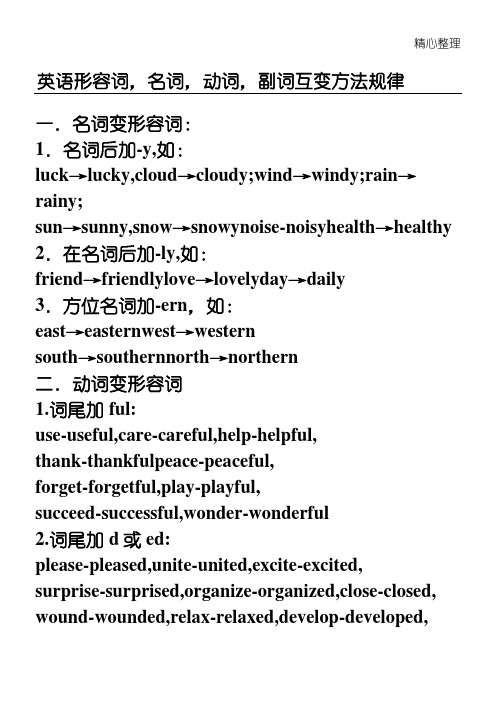
精心整理英语形容词,名词,动词,副词互变方法规律一.名词变形容词:1.名词后加-y,如:luck→lucky,cloud→cloudy;wind→windy;rain→rainy;sun→sunny,snow→healthy2.在名词后加-ly,如:friend→friendlylove→3.方位名词加-erneast→south→1.forget-forgetful,play-playful,succeed-successful,wonder-wonderful2.词尾加d或ed:please-pleased,unite-united,excite-excited,surprise-surprised,organize-organized,close-cl osed,wound-wounded,relax-relaxed,develop-developed, appreciate-appreciated,frustrate-frustrated, interest-interested,annoy-annoyed,use-used, frighten-frightened,crowd-crowded,thrill-thrilled,pollute-polluted3.词尾加ing:interest-interesting,surprise-surprising,live-livingrock-rocking,sleep-sleeping4.词尾变y为i,加ed:worry-worried,marry-married,fry-fried,terrify-terrifiedsatisfy-satisfied5.词尾加able:know-knowledgeable,enjoy-enjoyabe,suit-suitabl e,adjust-adjustable,comfort-comfortable6.其它:lose-lost,fool-foolish,live-livelysleep-sleepy/sleeping/asleep,wake-awake,taste-tastycational,world-worldwide例词1.2.以le为lypossible----possiblyterrible----terriblycomfortable----comfortablygentle----gentlysimple----simply3.以y结尾的形容词变y为ilyeasy----easilyangry----angrilynoisy----noisilyhappy----happilyheavy----heavilyhealthy----healthily不规则变化fast----fastearly----earlyhigh----highhard----hardlate----late形容词和副词为完全不同的单词good----well需要去掉字母e的单词true----trulygentle----gentlyterrible----terribly虽然以ly结尾,但却是形容词,不能直接用来修饰动词friendlylivelylovelylonelyLikely式。
形容词变副词的规则

形容词变副词的规则在英语语法中,形容词可以通过一定的规则变成副词。
这些规则是非常重要的,因为副词在句子中扮演着非常重要的角色,它可以修饰动词、形容词或其他副词,从而为句子增添更多的信息。
本文将介绍形容词变副词的规则,帮助读者更好地理解这一语法知识。
一、一般规则大多数形容词可以通过在词尾加上“-ly”来变成副词。
例如:- quick(形容词)→ quickly(副词)- careful(形容词)→ carefully(副词)- happy(形容词)→ happily(副词)- slow(形容词)→ slowly(副词)二、以“y”结尾的形容词以“y”结尾的形容词,通常将“y”变成“i”,再加上“-ly”来变成副词。
例如:- easy(形容词)→ easily(副词)- happy(形容词)→ happily(副词)- angry(形容词)→ angrily(副词)三、以“le”结尾的形容词以“le”结尾的形容词,通常直接在词尾加上“-ly”来变成副词。
例如:- gentle(形容词)→ gently(副词)- simple(形容词)→ simply(副词)四、不规则变化有一些形容词的副词形式是不规则的,需要单独记忆。
例如:- good(形容词)→ well(副词)- fast(形容词)→ fast(副词)- hard(形容词)→ hard(副词)五、形容词和副词相同有一些形容词的形式和副词的形式是相同的,它们在句子中的作用通过上下文来区分。
例如:- early(形容词/副词):She arrived early.(副词) vs. It's an early train.(形容词)六、注意特殊情况有一些形容词变成副词时需要注意特殊情况,例如“hard”和“fast”就是副词形式和形容词形式相同的特殊情况。
另外,有些副词是通过短语来构成的,如“in a hurry”(匆忙地)、“on purpose”(故意地)等。
初中语法:形容词及副词的比较级、最高级
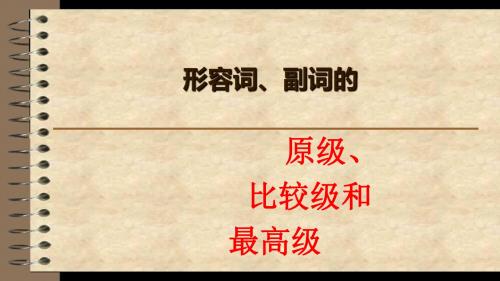
4、一般的形容词或副词的比较级前面可以加much/a little/even/still,而表示 数量的more之前还可以加some/any/no/one/two/many/several/a lot 等词。
如:It is much hotter today than yesterday. 今天比昨天热多了。 Would you like some more coffee? 你还要些咖啡吗? He did not eat any more. 他没有再吃。
5、more than /less than 分别可以理解为“多于/少于”,相当于 副词, more than = over; less than = under.
如:I lived in New Youk for more than four months. 我在纽约生活了四个多月。 6、“one of the +最高级+名词(复数)”整个短语为单数形式,谓语要用 单数形式。 如:One of the oldest house has been burned in a fire. 最古老的一幢房子在一场大火中被烧毁了。
※两者之 间没有差别时,使用句型:
主语(第一个人物)+谓语动词+as+形容词/副词原级+as+第二个人物
+...
如:He is as excited as his younger sister. 他和他妹妹一样兴奋。 ※ 表示第一个人比不上第二个人时,使用句型: 主语(第一个人物)+谓语动词(否定式)+as/so+形容词/副词原级 +as+第二个人物+... 如:He is not as/so excited as his younger sister. 他没他妹妹那么兴奋。
英语形容词,名词,动词,副词 互变方法规律

英语形容词,名词,动词,副词互变方法规律一.名词变形容词:1.名词后加-y,如:luck→lucky,cloud→cloudy;wind→windy;rain→rainy; sun23eastsouth1.2.please-pleased,unite-united,excite-excited,surprise-surprised,organize-organized,close-closed, wound-wounded,relax-relaxed,develop-developed, appreciate-appreciated,frustrate-frustrated,interest-interested,annoy-annoyed,use-used,frighten-frightened,crowd-crowded,thrill-thrilled, pollute-polluted3.词尾加ing:interest-interesting,surprise-surprising,4.5.know-knowledgeable,enjoy-enjoyabe,suit-suitable,adjust-adjustable,comfort-comfortable6.其它:lose-lost,fool-foolish,live-livelysleep-sleepy/sleeping/asleep,wake-awake,taste-tastyspeak-spoken,break-broken,die-dead,educate-aducatio nal,world-worldwide三.形容词变副词规律小结例词1.2.以3.以变yangry----angrilynoisy----noisilyhappy----happilyheavy----heavilyhealthy----healthily不规则变化本身既是形容词也是副词,无需改变fast----fastearly----earlyhigh----high词friendlylivelylovelylonelyLikely有些形容词本身即为副词,同时也有加ly的副词形式。
常用的不规则变化的形容词的比较级和最高级
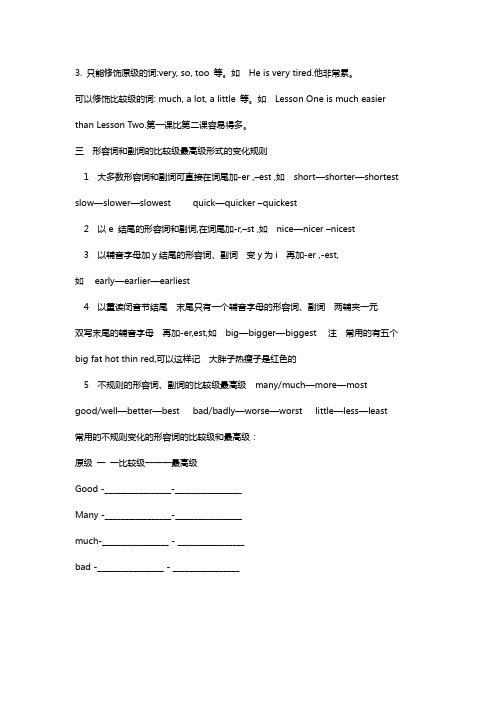
3. 只能修饰原级的词:very, so, too 等。
如He is very tired.他非常累。
可以修饰比较级的词: much, a lot, a little 等。
如Lesson One is much easier than Lesson Two.第一课比第二课容易得多。
三形容词和副词的比较级最高级形式的变化规则1大多数形容词和副词可直接在词尾加-er ,–est ,如short—shorter—shortest slow—slower—slowest quick—quicker –quickest2以e 结尾的形容词和副词,在词尾加-r,–st ,如nice—nicer –nicest3以辅音字母加y结尾的形容词、副词变y为i再加-er ,-est,如early—earlier—earliest4以重读闭音节结尾末尾只有一个辅音字母的形容词、副词两辅夹一元双写末尾的辅音字母再加-er,est,如big—bigger—biggest 注常用的有五个big fat hot thin red,可以这样记大胖子热瘦子是红色的5不规则的形容词、副词的比较级最高级many/much—more—mostgood/well—better—best bad/badly—worse—worst little—less—least 常用的不规则变化的形容词的比较级和最高级:原级一一比较级一一一最高级Good -_________________-_________________Many -_________________-_________________much-_________________ - _________________bad -_________________ - _________________五专项训练1写出下列形容词副词的比较级最高级。
young _______ _______ large _______ _______ far _______ _______easy _______ _______ much _______ _______ little _______ ______small _______ _______ late _______ _______ fat _______ _______busy _______ _______ red _______ _______ good _______ _______delicious ______________________________________ ________________________________ beautiful ________________________________ __________________________2用所给的形容词副词的适当形式填空。
英语形容词,名词,动词,副词互变方法规律

英语形容词,名词,动词,副词互变方法规律一.名词变形容词:1 .名词后加-y,如:luck^ lucky, cloud k cloudy; wind R windy; rain^ rainy; sun^ sunny, snow> snowy noise-noisy healt R healthy2. 在名词后加-ly,如:friend^ friendly love R lovely day R daily3. 方位名词加-ern,如:east R eastern wes R westernsouth R southern north R northern二.动词变形容词1.词尾加ful:use - useful, care - careful, help - helpful, thank - thankful peace - peaceful, forget - forgetful, play - playful,succeed - successful, wonder - wonderful2.词尾加d或ed:please - pleased, unite - united, excite - excited, surprise - surprised, organize - organized, close - closed, wound - wounded, relax - relaxed,develop - developed, appreciate - appreciated,frustrate - frustrated, interest - interested, annoy - annoyed, use - used, frighten - frightened, crowd - crowded, thrill - thrilled, pollute - polluted3■词尾加ing:interest - interesting,surprise - surprising,excite - excitingdevelop - developing,frighten - frightening,thrill - thyrillingfrustrate - frustrating,relax _ relaxing,live - livingrock - rocking,sleep - sleeping4.词尾变y为i,加ed:worry - worried, marry - married,fry - fried, terrify - terrified satisfy - satisfied5■词尾加able:know - knowledgeable, enjoy - enjoyabe,suit - suitable adjust - adjustable, comfort - comfortable6.其它: lose - lost, fool - foolish, live - livelysleep - sleepy / sleeping / asleep,wake - awake, taste -tastyspeak - spoken, break - broken, die - dead, educate - aducational,world - worldwide三.形容词变副词规律小结例词1. 大部分形容词加lycareless----carelesslyquiet----quietlydifferent----differently2. 以le结尾的形容词变le为lypossible——possiblyterrible-■■-terribly comfortable-■■-comfortably gentle——gently simple-■■-simply3.以y结尾的形容词变y为ilyeasy-■■-easily angry----angrily noisy----noisily happy——happily heavy----heavily healthy----healthily 不规则变化本身既是形容词也是副词,无需改变fast・・・・fastearly----early high----high hard----hard late----late far----far wide----wide alone----alone 形容词和副词为完全不同的单词good-■■-well需要去掉字母e的单词true-■■-trulygentle——gentlyterrible-■■-terribly虽然以ly结尾,但却是形容词,不能直接用来修饰动词friendly lively lovely lonely Likely有些形容词本身即为副词,同时也有加ly的副词形式。
英语形容词-名词-动词-副词-互变方法规律

英语形容词,名词,动词,副词互变方法规律一.名词变形容词:1.名词后加-y, 如:luck→lucky, cloud→cloudy; wind→windy; rain→rainy; sun→sunny, snow→snowy noise-noisy health→healthy2.在名词后加-ly, 如:friend→friendly love→lovely day→daily3.方位名词加-ern,如:east→eastern west→westernsouth→southern north→northern二.动词变形容词1.词尾加ful:use - useful, care - careful, help - helpful, thank - thankful peace - peaceful,forget - forgetful, play - playful,succeed - successful, wonder - wonderful2.词尾加d或ed:please - pleased, unite - united, excite - excited,surprise - surprised, organize - organized, close - closed, wound - wounded, relax - relaxed,develop - developed, appreciate - appreciated,frustrate - frustrated,interest - interested, annoy - annoyed, use - used, frighten - frightened, crowd - crowded, thrill - thrilled, pollute - polluted3.词尾加ing:interest - interesting,surprise - surprising, excite - excitingdevelop - developing, frighten - frightening, thrill - thyrillingfrustrate - frustrating, relax _ relaxing,live - livingrock - rocking, sleep - sleeping4.词尾变y为i,加ed:worry - worried, marry - married,fry - fried, terrify - terrified satisfy - satisfied5.词尾加able:know - knowledgeable, enjoy - enjoyabe,suit - suitable,adjust - adjustable, fort - fortable6.其它:lose - lost, fool - foolish, live - livelysleep - sleepy / sleeping / asleep,wake - awake, taste - tastyspeak - spoken, break - broken, die - dead, educate - aducational,world - worldwide三.形容词变副词规律小结例词1.大部分形容词加lycareless----carelesslyquiet----quietlydifferent----differently2.以le结尾的形容词变le为ly possible----possiblyterrible----terriblyfortable----fortablygentle----gentlysimple----simply3.以y结尾的形容词变y为ilyeasy----easilyangry----angrilynoisy----noisilyhappy----happilyheavy----heavilyhealthy----healthily不规则变化本身既是形容词也是副词,无需改变fast----fastearly----earlyhigh----highhard----hardlate----latefar----farwide----widealone----alone形容词和副词为完全不同的单词good----well需要去掉字母e的单词true----trulygentle----gentlyterrible----terribly虽然以ly结尾,但却是形容词,不能直接用来修饰动词friendlylivelylovelylonelyLikely有些形容词本身即为副词,同时也有加ly的副词形式。
最新中考英语不规则动词名词形容词副词形式变换

1不规则动词21.A-A-A型(无变化的动词)345cut-cut-cut let-let-let hit-hit-hit put-put-put 6cost-cost-cost hurt-hurt-hurt read/ri d/-read[red]-read[red]72.A-A-B型(现在式和过去式同形)8910beat-beat-beaten11123.A-B-A型(现在式和过去分词同形)1314come-came-come1516become-became-become17run-ran-run18194.A-B-B型(动词的过去式与过去分词相同)202122(1)词尾的“d”变为“t”或词尾是“n”加“t”2324build-built-built lend-lent-lent send-sent-sent 25spend-spent-spent2627burn-burnt/burned-burnt/burned 28learn-learnt/learned-learnt/learned2930mean-meant-meant3132(2)把原形变为aught及ought的变化(如果原形有a则是aught,33无a则是ought)3435buy-bought-bought bring-brought-brought 36think-thought-thought37fight-fought-fought catch-caught-caught3839teach-taught-taught(3)eep变ept或过去式、过去分词含有/e/音的动词414243keep-kept-kept sleep-slept-slept sweep-swept-swept 44leave-left-left45say-said-said meet-met-met spell-spelt-spelt464748smell-smelt/smelled-smelt/smelled hold-held-held 49feel-felt-felt5051(4)其他52dig-dug-dug find-found-found stand-stood-stood535455understand-understood-understood get-got-got sit-sat-sat5657spoil-spoilt-spoilt have/has-had-had sell-sold-sold 58tell-told-told hang-hanged/hung-hanged/hung hear-heard-heard 59make-made-madepay-paid-paid lay-laid-laid lie(说谎)-lied-lied6162lose-lost-lost6364shine-shone/shined-shone/shined win-won-won 65shoot-shot-shot665.A-B-C型(现在式、过去式和过去分词都不相同)676869(1)in、im的变化(i-a-u型)7071sing-sang-sung ring-rang-rung begin-began-begun7273drink-drank-drunk swim-swam-swum sink-sank-sunk7475(2)在动词原形后加-n或-en构成过去分词76①ow及aw的变化(过去式以ew结尾,过去分词以wn结尾)7778draw-drew-drawn know-knew-known throw-threw-thrown798081blow-blew-blown grow-grew-grown fly-flew-flown8283②元音是i的开音节的变化(过去分词以en结尾)8485drive-drove-driven rise-rose-risen ride-rode-ridden8687write-wrote-written give-gave-given88③其他899091see-saw-seen eat-ate-eaten take-took-taken fall-fell-fallen freeze-froze-frozen show-showed-shown9293break-broke-broken9495speak-spoke-spoken wake-woke-woken choose-chose-chosen9697forget-forgot-forgotten lie(躺,放)-lay-lain wear-wore-worn9899be(am,is,are)-was/were-been100101(3)其他102go-went-gone do-did-done1031041056.有过去式,没有过去分词的动词106107can-could may-might must-must shall-should will-would 108109不规则名词复数形式1101111.以-f或-fe结尾的名词变复数112113(1)加-s,如:114belief-beliefs roof-roofs gulf-gulfs115116(2)去f,fe加-ves,如:117118119half-halves knife-knives leaf-leaves life-lives120wolf-wolves121122thief-thieves self-selves wife-wives shelf-shelves123124歌诀记忆:树叶(leaf)半数(half)自己(self)黄;妻子(wife)拿125刀(knife)去割粮;架(shelf)后窜出一匹狼(wolf);就像小偷(thief)逃命(life)亡。
初中英语四大词形变化规律(动词 名词 形容词 副词)
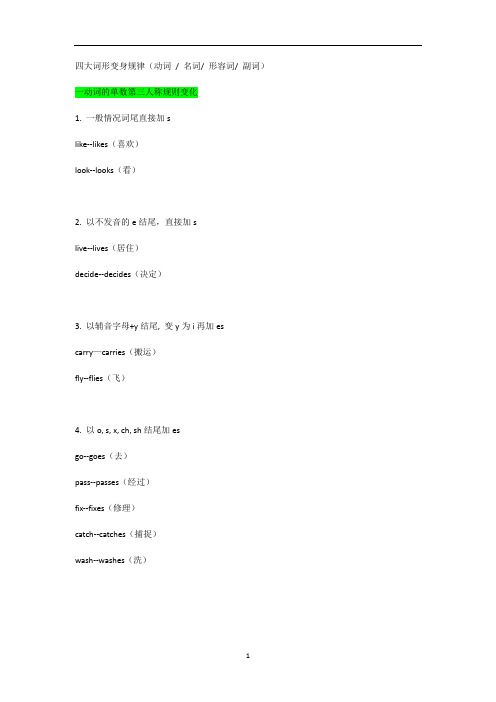
四大词形变身规律(动词/ 名词/ 形容词/ 副词)一动词的单数第三人称规则变化1. 一般情况词尾直接加slike--likes(喜欢)look--looks(看)2. 以不发音的e结尾,直接加slive--lives(居住)decide--decides(决定)3. 以辅音字母+y结尾, 变y为i再加es carry—carries(搬运)fly--flies(飞)4. 以o, s, x, ch, sh结尾加esgo--goes(去)pass--passes(经过)fix--fixes(修理)catch--catches(捕捉)wash--washes(洗)二动词的过去式规则变化1. 一般情况,词尾直接加edwork-- worked(工作)look--looked (看)2. 以不发音的e结尾的单词,直接加dlive--lived(居住)use--used(使用)3. 以辅音字母+y结尾的,变y为i加edstudy--studied (学习)worry--worried(担心)4. 以重读闭音节结尾,且末尾只有一个辅音字母的动词,双写最后的辅音字母加ed stop-- stopped (停止)plan--planned(计划)三动词的现在分词规则变化1. 一般情况,词尾直接加ingdrink--drinking(喝)sleep--sleeping(睡觉)2. 以不发音的e结尾,去e,再加ing.use--using(使用)write--writing(写)3. 以重读闭音节结尾,且末尾只有一个辅音字母的动词,双写最后的辅音字母,加ing.如:put--putting(放置)run--running(跑步)4. 部分以ie结尾的动词,变ie为y,加ingdie--dying(死亡)lie--lying(躺下)四可数名词变复数规则变化1. 一般在名词词尾加"-s"map--maps(地图)bird--birds(鸟)2. 以fe或f结尾的名词,把fe或f变为v加"-es"knife--knives(小刀)leaf--leaves(树叶)3. 以辅音字母加y结尾的名词,变y为i加"-es "baby--babies(婴儿)family--families(家庭)4. 以s, x, ch, sh结尾的名词加"-es"box--boxes(盒子)class--classes(班级)watch--watches(手表)dish--dishes(盘)5. 部分以o结尾的有生命的名词后面加"-es"tomato--tomatoes(西红柿)potato--potatoes(土豆)hero--heroes(英雄)五(单音节/部分双音节)形容词/副词的比较级最高级的规则变化1. 一般情况下,比较级+er ,最高级+estsmall--smaller--smallest(小的)--(较小的)--(最小的)slow--slower--slowest(慢的)--(较慢的)--(最慢的)2. 以不发音e结尾的单词,比较在原级后加-r,最高级在原级后加-st;nice--nicer--nicest(和蔼的)-(较和蔼的)-(最和蔼的)free--freer--freest(免费的)-(较免费的)-(最免费的)3. 以“辅音字母+y”结尾的单词,把y改为i,比较级加-er,最高级加-est;easy--easier--easiest(容易的)-(较容易的)-(最容易的)busy--busier--busiest(忙碌的)-(较忙碌的)-(最忙碌的)4. 以重读闭音节结尾,且末尾只有一个辅音字母的动词,双写最后的辅音字母,比较级再加-er,最高级再加-est;hot--hotter--hottest(热的)--(较热的)--(最热的)big--bigge--biggest(大的)--(较大的)--(最大的)。
不规则动词变化表

不规则动词变化表不规则动词一直是英语中的难点。
首先,动词的不规则变化虽然是规则的,但是变化还是很多的。
为了帮助你更好的掌握动词的不规则变化,为你准备了136个动词不规则变化表,让你更清楚的知道动词的过去式、过去分词、现在分词、第三人称单数是什么。
为了帮助大家更好的理解这张表,下面为大家整理了《英语形容词,名词,动词,副词互变方法规律》,希望可以帮助到大家。
英语形容词,名词,动词,副词互变方法规律一.名词变形容词:1.名词后加-y, 如:luck→lucky, cloud→cloudy; wind→windy; rain→rainy; sun→sunny, snow→snowy noise-noisy health→healthy2.在名词后加-ly, 如:friend→friendly love→lovely day→daily3.方位名词加-ern,如:east→eastern west→westernsouth→southern north→northern二.动词变形容词1.词尾加ful:use - useful, care - careful, help - helpful,thank - thankful peace - peaceful,forget - forgetful, play - playful,succeed - successful, wonder - wonderful2.词尾加d或ed:please - pleased, unite - united, excite - excited, surprise - surprised, organize - organized, close - closed, wound - wounded, relax - relaxed,develop - developed, appreciate - appreciated,frustrate - frustrated, interest - interested, annoy - annoyed, use - used, frighten - frightened, crowd - crowded, thrill - thrilled, pollute - polluted3.词尾加ing:interest - interesting,surprise - surprising,excite - excitingdevelop - developing,frighten - frightening,thrill - thyrillingfrustrate - frustrating,relax _ relaxing,live - livingrock - rocking,sleep - sleeping4.词尾变y为i,加ed:worry - worried, marry - married,fry - fried, terrify - terrified satisfy - satisfied5.词尾加able:know - knowledgeable, enjoy - enjoyabe,suit - suitable, adjust - adjustable, fort - fortable6.其它:lose - lost, fool - foolish, live - livelysleep - sleepy / sleeping / asleep,wake - awake, taste - tastyspeak - spoken, break - broken, die - dead, educate - aducational,world - worldwide三.形容词变副词规律小结例词1.大部分形容词加lycareless----carelesslyquiet----quietlydifferent----differently2.以le结尾的形容词变le为lypossible----possiblyterrible----terriblyfortable----fortablygentle----gently3.以y结尾的形容词变y为ilyeasy----easilyangry----angrilynoisy----noisilyhappy----happilyheavy----heavilyhealthy----healthily不规则变化本身既是形容词也是副词,无需改变fast----fast early----earlyhigh----highhard----hardlate----latefar----farwide----widealone----alone形容词和副词为完全不同的单词good----well需要去掉字母e的单词true----truly虽然以ly结尾,但却是形容词,不能直接用来修饰动词friendlylivelylovelylonelyLikely有些形容词本身即为副词,同时也有加ly的副词形式。
英语形容词,名词,动词,副词 互变方法规律

英语形容词,名词,动词,副词互变方法规律一.名词变形容词:1.名词后加-y, 如:luck→lucky, cloud→cloudy; wind→windy; rain→rainy; sun→sunny, snow→snowy noise-noisy health→healthy2.在名词后加-ly, 如:friend→friendly love→lovely day→daily3.方位名词加-ern,如:east→eastern west→westernsouth→southern north→northern二.动词变形容词1.词尾加ful:use - useful, care - careful, help - helpful,thank - thankful peace - peaceful,forget - forgetful, play - playful,succeed - successful, wonder - wonderful2.词尾加d或ed:please - pleased, unite - united, excite - excited, surprise - surprised, organize - organized, close - closed, wound - wounded, relax - relaxed,develop - developed, appreciate - appreciated,frustrate - frustrated, interest - interested, annoy - annoyed, use - used, frighten - frightened, crowd - crowded, thrill - thrilled, pollute - polluted3.词尾加ing:interest - interesting,surprise - surprising,excite - excitingdevelop - developing,frighten - frightening,thrill - thyrillingfrustrate - frustrating,relax _ relaxing,live - livingrock - rocking,sleep - sleeping4.词尾变y为i,加ed:worry - worried, marry - married,fry - fried, terrify - terrified satisfy - satisfied5.词尾加able:know - knowledgeable, enjoy - enjoyabe,suit - suitable,adjust - adjustable, comfort - comfortable6.其它:lose - lost, fool - foolish, live - livelysleep - sleepy / sleeping / asleep,wake - awake, taste - tastyspeak - spoken, break - broken, die - dead, educate - aducational,world - worldwide三.形容词变副词规律小结例词1.大部分形容词加lycareless----carelesslyquiet----quietlydifferent----differently2.以le结尾的形容词变le为lypossible----possiblyterrible----terriblycomfortable----comfortablygentle----gently3.以y结尾的形容词变y为ilyeasy----easilyangry----angrilynoisy----noisilyhappy----happilyheavy----heavilyhealthy----healthily不规则变化本身既是形容词也是副词,无需改变fast----fastearly----earlyhigh----highhard----hardlate----latefar----farwide----widealone----alone形容词和副词为完全不同的单词good----well需要去掉字母e的单词true----trulygentle----gently虽然以ly结尾,但却是形容词,不能直接用来修饰动词friendlylivelylovelylonelyLikely有些形容词本身即为副词,同时也有加ly的副词形式。
英语形容词-名词-动词-副词-互变方法规律
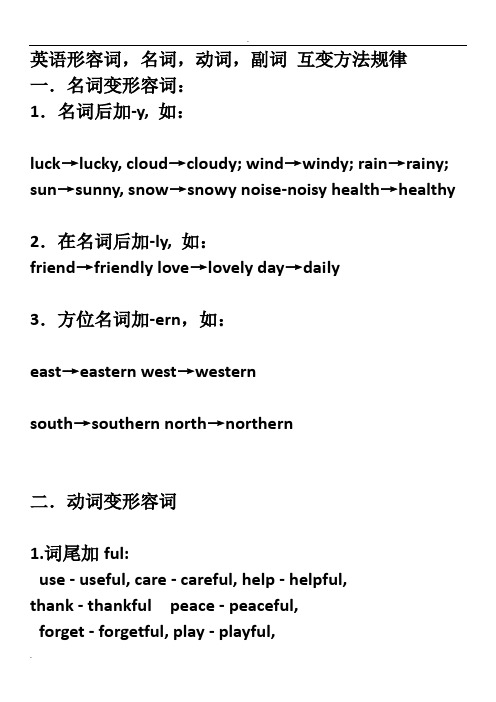
英语形容词,名词,动词,副词互变方法规律一.名词变形容词:1.名词后加-y, 如:luck→lucky, cloud→cloudy; wind→windy; rain→rainy; sun→sunny, snow→snowy noise-noisy health→healthy2.在名词后加-ly, 如:friend→friendly love→lovely day→daily3.方位名词加-ern,如:east→eastern west→westernsouth→southern north→northern二.动词变形容词1.词尾加ful:use - useful, care - careful, help - helpful,thank - thankful peace - peaceful,forget - forgetful, play - playful,succeed - successful, wonder - wonderful2.词尾加d或ed:please - pleased, unite - united, excite - excited, surprise - surprised, organize - organized, close - closed, wound - wounded, relax - relaxed,develop - developed, appreciate - appreciated,frustrate - frustrated, interest - interested, annoy - annoyed, use - used, frighten - frightened, crowd - crowded, thrill - thrilled, pollute - polluted3.词尾加ing:interest - interesting,surprise - surprising,excite - excitingdevelop - developing,frighten - frightening,thrill - thyrillingfrustrate - frustrating,relax _ relaxing,live - livingrock - rocking,sleep - sleeping4.词尾变y为i,加ed:worry - worried, marry - married,fry - fried, terrify - terrified satisfy - satisfied5.词尾加able:know - knowledgeable, enjoy - enjoyabe,suit - suitable,adjust - adjustable, comfort - comfortable6.其它:lose - lost, fool - foolish, live - livelysleep - sleepy / sleeping / asleep,wake - awake, taste - tastyspeak - spoken, break - broken, die - dead, educate - aducational,world - worldwide三.形容词变副词规律小结例词1.大部分形容词加lycareless----carelesslyquiet----quietlydifferent----differently2.以le结尾的形容词变le为lypossible----possiblyterrible----terriblycomfortable----comfortablygentle----gentlysimple----simply3.以y结尾的形容词变y为ilyeasy----easilyangry----angrilynoisy----noisilyhappy----happilyheavy----heavilyhealthy----healthily不规则变化本身既是形容词也是副词,无需改变fast----fastearly----earlyhigh----highhard----hardlate----latefar----farwide----widealone----alone形容词和副词为完全不同的单词good----well需要去掉字母e的单词true----trulygentle----gentlyterrible----terribly虽然以ly结尾,但却是形容词,不能直接用来修饰动词friendlylivelylovelylonelyLikely有些形容词本身即为副词,同时也有加ly的副词形式。
分词,过去式,副词,三单的变化规则及练习
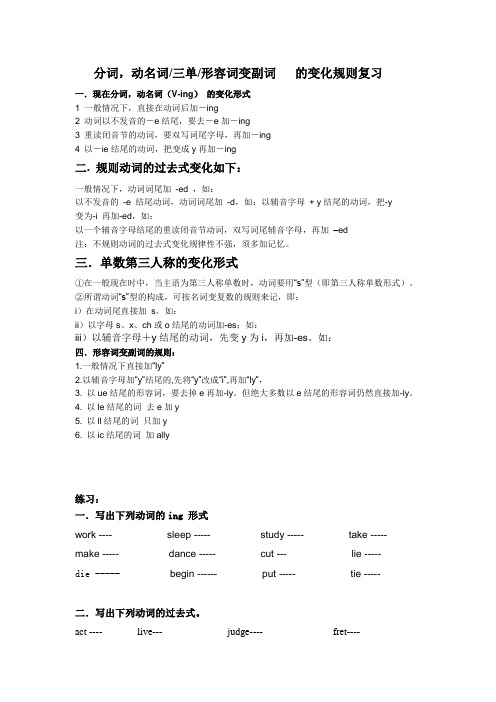
分词,动名词/三单/形容词变副词的变化规则复习一.现在分词,动名词(V-ing)的变化形式1 一般情况下,直接在动词后加-ing2 动词以不发音的-e结尾,要去-e加-ing3 重读闭音节的动词,要双写词尾字母,再加-ing4 以-ie结尾的动词,把变成y再加-ing二. 规则动词的过去式变化如下:一般情况下,动词词尾加-ed ,如:以不发音的-e 结尾动词,动词词尾加-d,如:以辅音字母+ y结尾的动词,把-y变为-i 再加-ed,如:以一个辅音字母结尾的重读闭音节动词,双写词尾辅音字母,再加–ed注:不规则动词的过去式变化规律性不强,须多加记忆。
三.单数第三人称的变化形式①在一般现在时中,当主语为第三人称单数时,动词要用“s”型(即第三人称单数形式)。
②所谓动词“s”型的构成,可按名词变复数的规则来记,即:i)在动词尾直接加s。
如:ii)以字母s、x、ch或o结尾的动词加-es;如:iii)以辅音字母+y结尾的动词,先变y为i,再加-es。
如:四.形容词变副词的规则:1.一般情况下直接加“ly”2.以辅音字母加“y”结尾的,先将“y”改成“i”,再加“ly”,3. 以ue结尾的形容词,要去掉e再加-ly。
但绝大多数以e结尾的形容词仍然直接加-ly。
4. 以le结尾的词去e加y5. 以ll结尾的词只加y6. 以ic结尾的词加ally练习:一.写出下列动词的ing 形式work ---- sleep ----- study ----- take ----- make ----- dance ----- cut --- lie -----die ----- begin ------ put ----- tie -----二.写出下列动词的过去式。
act ---- live--- judge---- fret----drag---- drop ---- plan---- work----do---- cry---- carry---- embody---- empty---- move---- try---- copy----study--- decide----- decline---- drip----hope ---- play---- beg ---- stop----want---- dot---- raise ---- wipe ---- justify----三.写出下列单词的第三人称单数形式play—worry—help—want—work—study—guess—fix—brush—get—know—go—do—catch—carry—teach—fly—watch—四.写出下列形容词的副词形式。
(完整word)形容词和副词的比较级不规则变化

形容词和副词的比较级不规则变化一、含义1。
大多数形容词和副词有三个等级:、、2。
比较级:表示 (人或物)之间的比较。
3最高级,表示“最……”的意思(以上作比较),形容词最高级前面一般要加,后面可带短语来表示比较的范围.4. 加的情况:①。
部分双音节和多音节词;②。
—ed/ing结尾的词③adj+ly→adv。
5. 双写的词:一个大热天,一个胖子和一个瘦子穿着红衣服,汗湿了,很伤心。
big hot fat thin red wet sad二.比较级基本句型:↗连系动词+ adj。
(比)如: Lucy is slower than Lily.1.主语+谓语动词+adj。
/adv(比)+ than+ 对比成分↘实义动词+ adv。
/ (比)如:Lucy runs more slowly than Lily.2。
主语必须与对比成分保持一致:Her hair is longer than yours。
(→your hair)3.…as+adj。
/adv.(原级)+as …: “如同…一样…”否定:… not as/so+adj。
/adv.(原级)+as …:“不如……一样……”4.比较级+and+比较级:越来越…… e。
g. They talked more and more loudly.5. The比较级…,the+比较级…:越…就越… The more exercise you do, the stronger you’ll be。
6. “Which / Who is + 比较级, A or B?” e.g。
Which T—shirt is nicer, this one or that one?7. the+比较级+of the( two ) :两者中较…的一个Of the twins, she was the more hard—working 。
8。
常用the one代单数可数名词,the ones /those 代替复数名词,that 代替不可数名词.e.g. The book here is newer than the one on the desk. The apples on the tree are fresher than those/the ones in the box. The weather in Wuhan is hotter than that in Beijing。
- 1、下载文档前请自行甄别文档内容的完整性,平台不提供额外的编辑、内容补充、找答案等附加服务。
- 2、"仅部分预览"的文档,不可在线预览部分如存在完整性等问题,可反馈申请退款(可完整预览的文档不适用该条件!)。
- 3、如文档侵犯您的权益,请联系客服反馈,我们会尽快为您处理(人工客服工作时间:9:00-18:30)。
不规则动词过去式过去分词巧记表AAA 型过去式、过去分词与原形一致 cut cut cut 切、割 shut shut shut 关、闭(门窗) 置 put put put 放 let let let 让 set set set 设置 hit hit hit 撞击 hurt hurt hurt 受伤; 疼痛 cost cost cost 值… 钱; 花费 读 AAB 型过去式与原形一致 beat beat beate n 击败 ABA 型过去分词与原形一致 run ran run 跑步; 逃跑 come came come 来 become became become 变得;成为 ABB 型过去式与过去分词一致 buy bought bought 买 fight fought fought 打架; 打仗 think thought thought 想;认为 seek sought sought 寻找; 探究 bring brought brought 带来 lend lent lent 借出 catch caught caught 抓住;接住 teach taught taught 教;教书 send sent sent 送;派遣 spend spent spent 花费(时间、金钱)build built built 建设;建立 leave left left 离开 feel felt felt 感觉;摸起来 keep kept kept 保持 保留 sleep slept slept 睡觉 oversleep overslept overslept 睡过头 sweep swept swept 打扫 mean [mi:n] meant [ment] meant [ment] 意思是 learn learnt / learned learnt /learned 学会 burn burnt / burned burnt / burned 燃烧;烧伤 听见 lead led led 领导;致使 跑 meet met met 遇见; 碰至U lit/lighted 点燃 get got got 获得;得到 dig dug dug 挖掘 read [ri:d] read [red] read [red] 朗读; 阅 feed fed fed 喂养;喂食shoot shot shot 射击hear heard heardfl ee f|e d f|e d 逃lightlit/lightedhang hanged hanged 绞死sit sat sat 坐下 stick stuck stuck 朿刺; 戳 hang hung hung悬挂 sell sold sold 出售 tell told told 告诉win won won 获胜; 赢得smell smelt smelt I 闻; 嗅 spell spelt spelt 拼写hold held held 拿着;握住find found found 找至J ;发现 stand stood stood 站立 lay laid laid 下 蛋,放置understand understood understood 理解 /has had had 有say [sei] said [sed] said [sed]说make made made 制 M 乍lose lost lost丢失shine shon e/sh ined shon e/sh ined 照耀 ABC 型 原形、过去式、过去分词不一致beg in bega n begu n 开始 drink drank drunk 喝; 饮 ring rang rung 铃(响);打电话sing sang sung 唱歌 sink sank sunk 下沉 swim swam swum 游泳 blow blew blown 吹;刮风 fly flew flown 飞;放风筝 know knew known 知 道;懂得grow grew grown 种植; 生长 throw threw thrown 扔; 投 draw drew drawn 绘画show showed shown 出示; 给…看 break broke broken 打破不服从 steal stole stolen 偷 sp eak sp oke sp oke n 说话 choose chose chose n 选择 frozen 冻结 wake woke woke / woken 醒来; 唤醒 forget forgot forgotten took taken 拿走mistake mistook mistake n 错拿 shake shook shake n 摇动;ate eate n 吃fall fell fallen 落下;摔倒 rise rose risen 上升;上涨 drive drove driven [drivn]驾驶give gave give n 给forgive forgave forgive n 原谅ride rode ridden 骑(车、马) hide hid hidden 躲藏 forbid forbade forbidde n 禁止; 不许 write wrote writtenborn 忍受tear tore torn 撕破 wear wore worn 穿、戴(衣帽等)是are were been 是 do/does did done 做 go went gone躺;卧注意:以一个辅音字母结尾的重读闭音节动词, 双写词尾辅音字母,再加-ed ,pay p aid p aid 付款 havestrike struck struck 敲击,罢工freeze froze忘记take 握(手) eatsee saw see n 看见 bitebit bitten 咬 书写bear boream/is was bee n去 lie lay lain如: stopped begged dragged dropped planned 以下动词加-ed 或-ing 要双写最后一个字母1. regret (regretted, regretting) 后悔制3. admit (admitted, admitting) 承认 5. prefer (preferred, preferring) 宁愿 7. forget (forgetting ) 忘1记 8. permit (permitted, permitting)允许 9. equip (eq uipp ed, equipping)装备注意:quarrel, signal, travel 中的l 可双写(英国英语)也可不 双写(美国英 语)形容词变副词规则形容词变副词通常是加ly,其变化有规律可循,请记住以下口诀: 一般直接加ly ,元e”去e 加,辅y”改i 加,“ 1逸吉尾e 改y 。
分别举例如下:quick-quickly; true-truly; happy-ha pp ily; p ossible-p ossibly具体规则如下:1•一般情况下直接加“ ly,'如:extreme-extremely; po lite-po litely; sad-sadly; imediate-immediately 2.少数以e 结尾的形容词,要去掉e 再加-ly 。
如:true-truly绝大多数辅音字母加 e 结尾的形容词直接加 -ly 。
如:P olite-p olitely; wide-widely; wise-wisely; nice-nicely 3.以“y 结尾的,且读音为 / i /,先将“y 改成“i,”再加“ly,”如:happy-ha pp ily; heavy-heavily; an gry-a ngrily; busy-busily但是如果读音为” 直接力口 ,如:4.以ic 结尾的词,加ally ,如:econom ic-ec ono mically; basic-basically; scie ntific-scie ntifically; automatic-automatically; energetic-energetically;但是 public-publicly 例外。
5.以辅音字母加le 结尾时,去e 加y ,如:2. control (controlled, controlling) 控 4. occur (occurred, occurri ng)出现 6. refer (referred, referring) 提到simple-simply; considerable-eonsiderably; terrible-terribly; gentie-gently; possible-possibly; probable-probably; incredible-incredibly 元音字母力口 le 时力口 如: sole-solely 。
但是 whole-wholly 例外。
6.以-ll 结尾时,只须加了,如:dull-dully需注意:有些以ly 结尾的词是形容词而非副词。
如:frien dly people; motherly care; lovely dog; mon thly exam; heave niy p eace高考常见词词形变换后缀---名词ability p ossibility respon sibility reality p rivacy discovery injury apo logy marriage shortage arrival survival refusal musicia n magicia n electricia n assistanee appearanee performanee guidanee importanee abse nee differe nee con fide nee p atie nee independence in tellige nee convenience beggar liar actor visitorin terviewer/i nterviewee tourist graduati on imag in ati on prep arati on sep arati on com muni cati on p olluti on in vitatio n creatio n in troductionimp ressi on discussi on exp ressi on pronun ciati on expl anationrecognition solutionfreedom childhood hon esty anxiety sufferi ng achieveme ntamuseme nt advertiseme nt agreeme nt ast oni shme nt excitement impro veme nt announ ceme nt argument judg(e)me nt kindness carelessness happiness sadness death growth health wealth youth stre ngth len gth failure mixture p leasure p ressure后缀---形容词comfortable fashi on able reliable un believable accessible enjo yable un forgettable n atural cultural medical musical social racial official ben eficial environmentaltraditional occasional original professionalsile neeinven tor sailortrain er/tra inee empio yer/e mpio yeebiologist pianist artistwisdom adulthoodsafety similarity difficultypo verty curiosity loyaltyheari ng warningscientific basic energeticgifted tale nted unexp ected disabledrainy sunny wealthy healthycheerful successful thankful careful powerful hopeful meaningful harmful usefulcreative impressive attractivepoisonous an xious dan gerous humorous前缀---变否定dis- dishonest dislike disagree disadvantage discourage disappear il-/i n-/im-/ir- imp olite imp ossible inconvenient independentin direct irres pon sible illegalun- unable uncertain unconscious unnecessary unbelievableun comfortableunfortun ately unfrien dly unemploymentmis- misfortune mis un dersta nd mislead。
